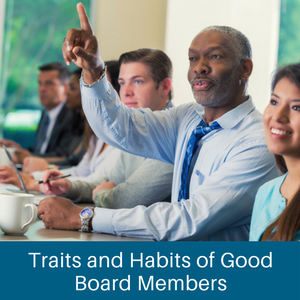Get on Board: Traits & Habits
Traits & Habits of Good Board Members
Being a successful board member begins with a genuine commitment to striving for high-quality public education that supports the full development of all children.
 There are certain skills and attributes which are consistently present in effective board members.
There are certain skills and attributes which are consistently present in effective board members.
Effective board members will:
- Be prepared to participate responsibly.
Do your homework, come prepared to work, remember that sometimes the work is to listen, agree and disagree as your values dictate, and accept that the group decision is legitimate even if it’s not your personal choice. It’s not acceptable to have opinions and not express them. - Focus on serving all children.
Ensure every deliberation, decision and action reflects the best interests of every student you serve. No child is more important than another. - Remember that your identity is with the community, not the staff.
It’s easy to identify with staff as you probably will have more discussions with them about issues. But you must remember that your job is to ensure the education of the children in your system. - Represent the community, not a single constituency.
You will understand and/or identify with certain constituencies (parents, neighborhoods or communities, special education, etc.), but you MUST remember that being a board member means serving the entire community. There’s no way five or seven people can provide a spokesperson for every constituency or legitimate interest, so in a moral sense you must stand for them all. You can be FROM a constituency, but you must not let yourself REPRESENT it. - Honor divergent opinions without being intimidated by them.
You are obligated to express your honest opinions on issues, and so are each of the other board members. Encourage your colleagues to speak their opinions and listen to them carefully and respectfully. But don’t allow yourself to be intimidated by louder or more insistent board members. - Use your special expertise to inform your colleagues’ wisdom.
If you have special expertise (law, accounting, construction, etc.) remember that you’re NOT personally responsible for decisions relating to that area. Use your expertise to help inform your colleagues (for example, help them understand what fiscal health looks like vs. fiscal jeopardy) but don’t assume sole responsibility for those decisions. Also remember that you’re not on the board to help the staff or even advise them with your special expertise. Your job as a board member is to participate in the governance of the school system. - Be aware of the community and staff’s perceptions of the board.
If the board is perceived as being dysfunctional, unethical, dishonest, secretive or self-serving, whether justified or not, that will become reality for the community and staff. Consider how stakeholders might interpret your behaviors and decisions then act accordingly. - Think upward and outward more than downward and inward.
There is a great temptation to focus on what goes on with management and staff instead of what difference the district should make in the larger world. This requires ignoring the minutia or details in order to examine, question, and define the big picture. The latter is a daunting and awesome task, but it’s board work – governance!
Next Item
